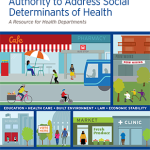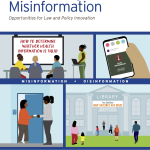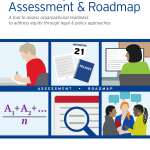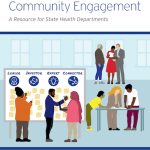By Jessica Nguyen & Patrick Glass
At a Glance
- State, tribal, local, and territorial (STLT) health departments handle crucial responsibilities for protecting the public’s health in emergency situations and over the longer term by working upstream to address social determinants of health (SDOH).
- STLT health departments fall along a broad continuum of readiness and capabilities to address SDOH and advance health equity through the tools of law and policy.
- In response to needs identified by public health practitioners, ChangeLab Solutions has created a suite of resources to strengthen health departments’ capacity to use law and policy to address the fundamental drivers of health inequity.
Assessing Health Department Readiness Across the United States
Across states, tribes, localities, and territories, approximately 3,000 health departments serve US residents. Over the past decade, several assessments and reports have explored the capabilities of those health departments to address health equity and use law and policy, as well as their policymaking and capacity-building needs.
To build on this work, beginning in November 2020 and concluding in March 2021, ChangeLab Solutions partnered with the Public Health Law Program at the Centers for Disease Control and Prevention (CDC) to conduct key informant interviews with STLT health department staff and to perform an environmental scan that explored how health departments define health equity and SDOH. These assessments also asked STLT partners how they were currently using law and policy and identified challenges and opportunities related to cross-sector collaboration and community engagement. This new body of work is intended (1) to support STLT health departments in operationalizing strategies to address the needs identified in previous research and (2) to serve as the basis for practical resources to help STLT health departments build their capacity to work on health equity and SDOH.
The eight key informant interviews included conversations with personnel in two state health departments, five local health departments, and one tribal health department. The interviewees came from diverse geographic locales covering six of the ten service regions defined by the US Department of Health and Human Services.
“Through comprehensive environmental scans and multi-year engagements with health department staff, we gained a lot of insight into the strengths and needs of health departments across the United States,” explains Alexis Etow, managing director at ChangeLab Solutions. “Analyzing all of this information allowed us to develop policymaking tools and resources that responded directly to health departments’ indicated needs.”
Tailored Resources for Health Departments
Some of the primary challenges for health departments identified in the research included concerns about funding and financing, staff capacity and expertise in law and policy, community mistrust of government interventions, and real and perceived legal barriers to advancing their work on SDOH and health equity. These research findings re-affirmed and expanded on what we had been hearing in the field for several years and directly informed the development of tools that would help health departments address these challenges.
“We found that while health departments shared common challenges and aspirations for advancing health equity, they exhibited differing levels of readiness for engaging with legal and policy work, addressing the social determinants of health, and promoting health equity,” says Jessica Nguyen, senior planner at ChangeLab Solutions. “Our response to these findings was to create resources and trainings that could support health department needs and meet them where they are.”
Based on the research findings, ChangeLab Solutions staff set about creating the following tools and resources:
- A resource on public health authority, which explains the sources, extent, and limits of legal authority delegated to health departments and provides examples of how health departments across the United States have applied their legal authority to address SDOH and reduce health inequities.
- A resource on confronting misinformation that offers an in-depth look at misinformation and disinformation for officials and staff at all levels in STLT health departments. This resource discusses evidence-based strategies for counteracting the spread of mis- and disinformation and their effects through the use of law, policy, community engagement, multi-sectoral partnerships, and other measures.
- A health department assessment and roadmap, which delineates stages on a continuum of readiness for STLT health departments to address SDOH and health equity through law and policy. The assessment tool will help health departments assess where they are on the continuum of readiness in five priority areas: institutional commitment, staff competence in SDOH, partnerships and engagement, data for action, and framing and communication. The roadmap provides guidance for activities to improve readiness in each priority area.
- A resource on supporting community engagement that provides guidance to help state health departments better understand the importance of equitable and inclusive community engagement in their work to address SDOH and promote the health and well-being of all their residents. The guide explains the roles and activities that state health departments can pursue to support local health departments’ community engagement efforts.
ChangeLab Solutions is launching these resources to help health departments address specific areas for improvement in advancing health equity through the tools of law and policy. Please consider signing up for our email list if you wish to be notified when resources are released in the future.
7/25/2024



